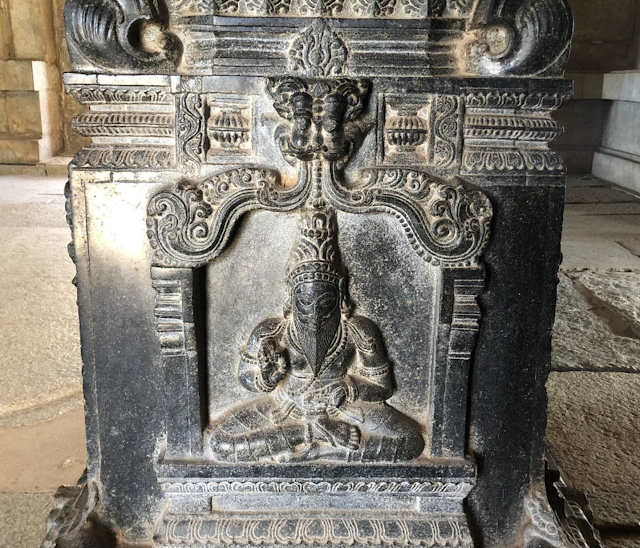If only they listened to him!
Vidura: The disregarded intellect
Background:
The Pandavas, along with their wife Draupadi, had completed 12 years of exile and 1 year of hiding. It was now time for retribution. The time to seek vengeance against the disgraceful events that unfolded 13 years ago—a game of dice in which the five Pandavas had lost their kingdom; Draupadi's disrobing, which reflected the ill-doings of the Kauravas and ensured misfortune upon those who remained silent during a despicable act. A war had been declared, and each side was required to send peacemakers in order to explore the most minute possibilities to avoid confrontation on a battlefield. Krishna, chieftain of the Yadavas, was sent from the Pandava side to relay the conditions.
"All the Pandavas ask for, King Dhritarashtra and Crown Prince Duryodhan, are five villages to govern independently—just five!" said Krishna, though, completely aware that even this justified proposal would be turned down by the foolish and violent Duryodhan. And as destiny were to present, "No," shouted the crown prince, unwilling to even let go of five tiny villages to his cousin brothers.
But before he could demean his cousins further, a strong voice from behind confronted Duryodhan's ego. "Think again, foolish prince! What you decline is a boon from God almighty to prevent your death on a battlefield." This was Vidura—prime minister of the kingdom of Hastinapur and uncle to the Pandavas and Kauravas.
A man of great intellect, wisdom, and righteous principles, Vidura was fully aware that the peacemaker sent by his righteous nephews (Pandavas) was none other than God himself. But his advice was never considered, for it was his misfortune and a curse that rendered his words useless to his kin.
Duryodhan ignored his uncle's warning, humiliating Lord Krishna in the courtroom and ensuring a war that would take place within the next few months.
This wasn't the only time Vidura was ignored. During Draupadi's disrobing, Vidura pleaded with Duryodhan to stop the humiliation of a woman. He, along with another Kaurava prince, Vikarna, were the only few to condemn the act and speak against it.
Feeling miserable and gutted that his advice was never even considered by his family, Vidura lamented on his fate. During the course of the bloody war, Vidura was always anxious, for he would only receive news of the deaths of his family members; however, he was joyous at the fact that the war was won by the righteous side.
As the curse had been fulfilled, it was now time for Vidura to let go of his physical body and transform into his celestial self— Yamaraja. The God of death, even in human form, had failed to successfully ensure justice and righteousness on earth—a testament that as the cycle of the world progressed (*Yugas), humans became more ignorant and wicked. It was now time for Yamaraja to govern justice in the realm of death, where one's deeds could not escape, unlike on earth.




Great narration.. keep it up
ReplyDeleteIt's so interesting and TRUE characteristic
ReplyDeleteNiyati, your interest in Hindu puranic kathas in this day and age, is commendable. Keep it up!
ReplyDeleteVery nice Niyati! You should do a series like this! All the best!
ReplyDeleteplanning one!
DeleteBeautifully written. Best wishes.
ReplyDeleteAppreciable effort. Keep it up.
ReplyDeleteVery nicely articulated Niyati. These lesser known facts are no less relevant, even in today's world. Thanks for sharing this beautiful blog. I look forward to many more !!!
ReplyDeletethx❤️
DeleteNiyati very beautifully explained the lesser known story on Vidura which proves the power of our Ancient Rishi’s in their curses as well as in their blessings and also the effects of karma whether good or bad. Commendable effort and keep up the good work.
ReplyDeleteVery well written and a worthy moral to end.
ReplyDeleteNicely written
ReplyDeletePlease write more of such articles.
Kids will enjoy reading them.
The blog aptly highlights that listening as a strength is so underrated and speaking up when you see something wrong rather than ignoring by saying it is not my problem to solve - relevant since yugas
ReplyDelete❤️
DeleteVery nice flow of thought.. happy to see a perspective focusing away from the larger than life characters. Keep it up
ReplyDeleteNiyati definitely has a flair for writing. The narration is seamless and interesting with a teaching very relevant in today's times- keep writing with this passion dear!
ReplyDelete🥰
DeleteNice narration
ReplyDeleteVery well articulated! A truly captivating read, succinctly capturing the story's essential lessons. Great post keep it up!
ReplyDeletewell written , Niyati!
ReplyDeleteBeautifully written Niyati, I could picture the scenes play out in my mind as I read through from start to end, without losing interest anywhere in between. You have the gift to enthrall and capture the readers attention with your work. And what a valuable takeaway at the end of it, to “listen”. I read this once, we do not listen to understand, we listen to reply! Life would be much less complicated if we did the former. Keep up the good work Niyati, you are indeed a gifted writer.
ReplyDeleteTruly spoken.....not listening enough is a loss for humanity.
DeleteVery nice. Keep up the good work
ReplyDeleteBeautifully written.. good work Niyati ❤️
ReplyDeleteNice narration. Keep growing Niyati!
ReplyDeleteExcellent writeup Niyati!! Would love to see more such articles. I have started following your blog now. 😊
ReplyDelete❤️
DeleteInteresting read, Niyati. Continue writing.
ReplyDeleteExcellent work niyati
ReplyDelete